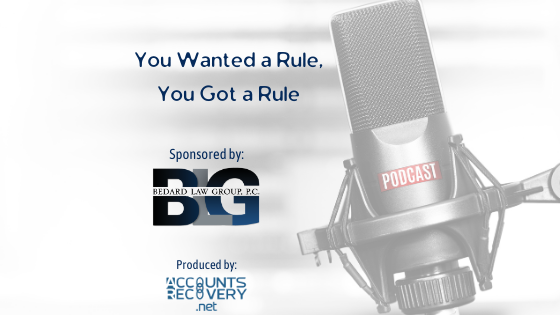Latest Episode of ‘The Narrative’ Breaks Down CFPB Report on Medical Debt Complaints
The increased focus and attention being paid to medical debts these days…
New Video Series Launched: Debut Episode Tackles White House’s Bulletin on Medical Debt
Everyday, there are legal rulings, compliance bulletins, bills that become law, and…
The Caselaw that Shaped the Industry in 2021
It is likely not a surprise to anyone what the most impactful…
Advice From the Experts on Day One of the Regulation F Era
The time has come for the rubber to meet the road. For…
Bedard Breaks Down Remaining Sections of Regulation F in Series Finale of ‘You Wanted a Rule, You Got a Rule’
After 35 episodes and nearly eight hours of in-depth analysis, we have…
Bedard Breaks Down How Collectors Must Send Disclosures Under Regulation F
In a lot of what's included in Regulation F, the Consumer Financial…
Bedard Breaks Down Reg F’s Section on Disputes
If there is one certainty about what is going to happen once…
Bedard Breaks Down Sending MVN in Other Languages
America is a melting pot of cultures and backgrounds. And that means…
Bedard Breaks Down Electronic Delivery of Validation Notices
For all of the excitement and possibility that surrounds the area of…
Bedard Finishes Analysis of Model Validation Notice’s Optional Disclosures
In the latest episode of "You Wanted a Rule, You Got a…





